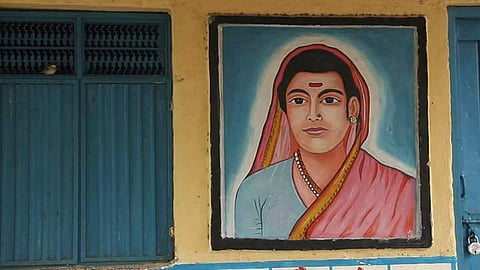

History has not given Savitribai Phule her due. She barely figures in our textbooks even if at all, but that is, of course, the case with most Bahujan revolutionaries. But in a country that takes its observance days so seriously (the government continues to add on to the already long list with days like Good Governance Day and Yoga Day), it is a pity that we know so little about the woman who revolutionised education in India.
Savitribai Phule and her husband, Mahatma Jyotirao Phule set up the first-ever school for women and also opened up schools for students from backward communities who were denied an education. Being a victim of caste discrimination herself, Phule struggled through extreme odds to be able to teach women and Dalit students. The story about how Phule always carried an extra sari in her bag because people would throw everything from garbage to cow dung on her as she walked to school every day is a well known one. She would apparently go to school, change into a clean saree every single day and then go on to teach her students who came from all sorts of backgrounds. So it is not surprising that a lot of people are of the opinion that Phule's birthday should be observed as Teachers' Day in India instead of September 5. We spoke to a few people about why they think so.
"Phule was the first woman in South East Asia who opened up a school only for girls and she was a self-taught woman. She also gave stipends to the students so that would not drop out. She is the person who pioneered the Right to Education Act because she strived to provide education to those who were denied," says Bobby Kunhu, a lawyer and writer. On the other hand, the lawyer says that Dr Sarvapalli Radhakrishnan was a privileged upper caste man who only really taught university for a couple of years and then moved on to politics. "He was even accused of plagiarism. So do we celebrate a man like that or do we celebrate Phule, who was a victim of caste discrimination and yet managed to educate women and the oppressed castes? She served society and worked for women's rights and widow's rights. Till the very end she served victims of the Bubonic Plague, something that killed her eventually," he asks.
Somnath Waghmare, a documentary filmmaker says when he started college at the Karmveeer Bhavurao Patil College, Islampur he was surprised to find that they observed Phule's birthday as Teachers' Day."After celebrating September 5 as Teachers' Day throughout school I finally felt like I had found out the truth when I reached college. My college was a progressive Ambedkerite one and so we learned how she was the one who ensured so many of our ancestors get an education," he said. Not just a teacher, he mentions, "She was also a literary person, a poet."
Grace Banu, an activist said that celebrating Radhakrishnan's birthday as Teachers' Day was just a reflection of our Brahmanical patriarchal society, "Phule and Fathima Sheikh (her partner) were oppressed themselves and fought against it. The contribution they made to society cannot even be compared to what Radhakrishnan did."
"She took a stand against patriarchy and she was probably one of the first women to empower women and people of oppressed classes. The story fo her carrying an extra sari in her bag because people threw stuff at her is such an inspiring story," says Jyoti Nisha who is working on a documentary called 'Ambedkar Now and Then'. "What good if you are privileged and get an education and cannot even think beyond caste? It is about time history paid its due to her and other Bahujan revolutionaries," she adds.
The case against Radhakrishnan has gotten worse with claims of plagiarism that surfaced some time ago. "Phule is the symbol of a democratic form of education. On the other hand, Radhakrishnan defended the Varna system and was against inter-caste marriage and believed that a child born out of an inter-caste marriagewouldl be "heavily handicapped". He was a man who was accused of plagiarism but Phule opened the doors of her school to the oppressed communities. But I also believe that Phule was probably the first to start a formal education school but I think the Bahujan women who came before her were also great teachers and they should all be celebrated," says Rajesh Rajamani, who runs the Facebook page, Indelible India and is a popular voice on social media.
